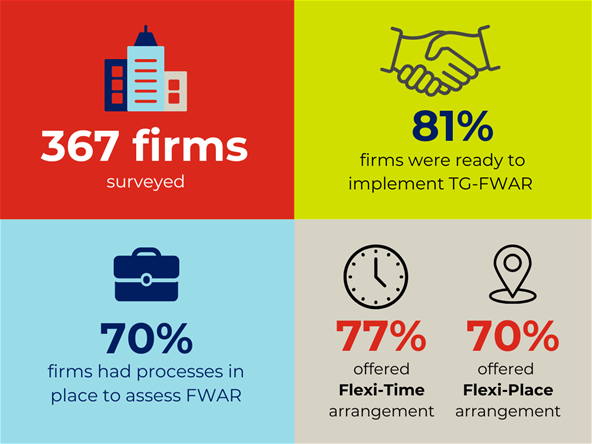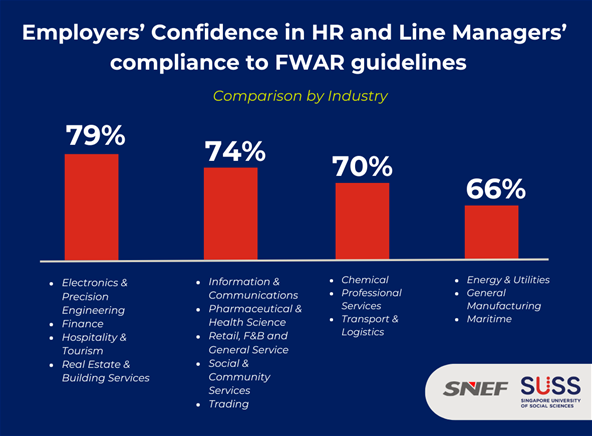Singapore, 10 February 2025 - A joint survey conducted by the Singapore University of Social Sciences (SUSS) and the Singapore National Employers Federation (SNEF) has revealed that eight in 10 employers in Singapore were prepared to implement the Tripartite Guidelines on Flexible Work Arrangement Requests (TG-FWAR). The survey, which gathered insights from 367 companies1 spanning more than 10 industries – including general manufacturing, energy, transport, retail, and food & beverage – highlighted broad readiness across sectors.
The findings, detailed in the report Employers’ Perspective on the Tripartite Guidelines on Flexible Work Arrangement Requests (TG-FWAR), indicate that while most employers were ready to manage flexible work arrangement (FWA) requests, certain industries faced unique challenges in adopting these practices.
Conducted between 5 and 30 September 2024, the survey found that 81% of employers felt prepared for TG-FWAR implementation, with seven in 10 firms already having established processes to assess FWA requests.

Furthermore, employers foresaw an increase in demand for FWAs, particularly among younger employees in their 20s to 40s, who sought them for caregiving responsibilities and improved work-life balance. As a result, offering FWAs was expected to become a key factor in attracting and retaining talent.
Following the implementation of the TG-FWAR, employers anticipated a rise in FWA requests, though they expected the volume to normalise and become standard practice within a few months.
Variations across industries
The survey also uncovered notable variations in TG-FWAR adoption across industries. Firms in the Finance sector expressed greater confidence in their human resource and line managers’ ability to comply with the guidelines. In contrast, industries with more structured operational schedules, such as Maritime and General Manufacturing, reported lower confidence levels.

Additionally, larger firms indicated that they are better equipped to manage FWA requests due to greater resources, while smaller firms cited challenges related to limited capacity. Despite these challenges, the study observed a growing receptiveness among employers to consider requests for flexi-time, flexi-place, and flexi-load arrangements.
Flexi-time (77%) and flexi-place (70%) were the most common flexible work arrangements across the industries, while flexi-load remained less prevalent at 26%. The survey found that industries such as Electronics & Precision Engineering, Finance, Hospitality & Tourism, and Information & Communications were more likely to adopt flexi-load, with adoption rates surpassing 40%.
Dr. Victor Seah, Director of the Behavioural Insights Centre of Excellence (BICE) at SUSS and Principal Investigator of the study said, “We are pleased to partner SNEF to better understand employers’ readiness and challenges in adopting the TG- FWAR. The findings provide valuable insights into Singapore's evolving workplace landscape, highlighting both opportunities and concerns.
While employers generally anticipate growing employee demand for FWAs, smaller firms face unique challenges in implementation and are less convinced of FWAs’ potential to attract and retain talent. On the other hand, larger firms see flexible work as a strategic advantage. Practical strategies from this study aim to help employers navigate these complexities, fostering healthier, more resilient, and productive work environments.”
Mr. Hao Shuo, CEO of SNEF said, "The introduction of the TG-FWAR represents a crucial development in reshaping Singapore’s workplace landscape. As noted in the study, employers recognise the value of FWAs and are willing to consider FWA requests that could be accommodated by their business operations, but it is important to employers that productivity can be sustained even when employees are on FWA.
SNEF has played a crucial role in supporting employers in their FWA journey. Our comprehensive ‘Guide to Assessing and Managing Flexible Work Arrangement Requests’ playbook offers practical tips, examples, and actionable steps for evaluating and managing FWA requests. This resource is available to the public on our website and enables employers to effectively adopt the guidelines under the TG-FWAR while optimising productivity of their workforce. SNEF will also continue to provide tailored resources, training, and advisory services to ensure successful adoption of TG-FWAR for all employers."
For more information and to download the report, visit https://suss.to/tg-fwar.
1 57% of respondents reported having workforces exceeding 100 employees
---
For media enquiries, please contact:
SUSS Mr. Aaron Nair
Public Relations Manager
Singapore University of Social Sciences
E:
[email protected] T: +65 6537 9518
Ms Melissa Ho
Public Relations Executive
Singapore University of Social Sciences
E:
[email protected] T: +65 6248 9138
---
SNEF Ms. Yvonne Lum
Head (Strategic Communications)
Singapore National Employers Federation
E:
[email protected] T: +65 9879 6522
Ms. Ezzatul Farhana
Assistant Manager (Strategic Communications)
Singapore National Employers Federation
E:
[email protected] T: +65 9674 4046
About Singapore University of Social Sciences
At SUSS, we have a singular vision to be a university that inspires learning for life and impacts lives, regardless of age, background or life path. We offer more than 100 undergraduate and graduate programmes, available in full- and part-time study modes which are flexible, modular and interdisciplinary, catering to both fresh school leavers and adult learners. SUSS also offers a broad range of continuing education and training modular courses for the professional skills upgrading of Singapore’s workforce.
For more information about SUSS, please visit www.suss.edu.sg.
About Singapore National Employers Federation (SNEF)
The Singapore National Employers Federation (SNEF) is a trade union of employers. Our mission is to advance tripartism and enhance labour market flexibility to enable employers to implement responsible employment practices for sustainable growth. SNEF has a membership of more than 3,800 companies with more than 860,000 employees. For more information, please visit www.snef.org.sg.